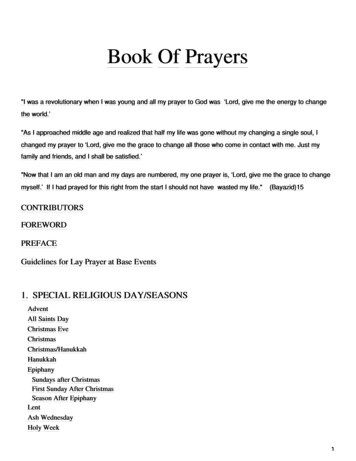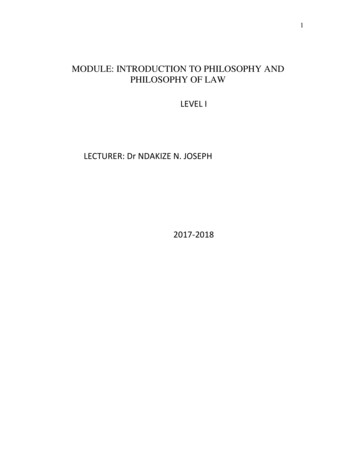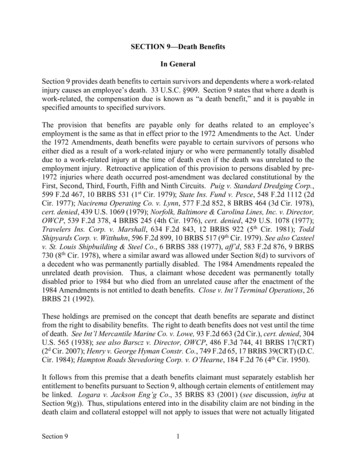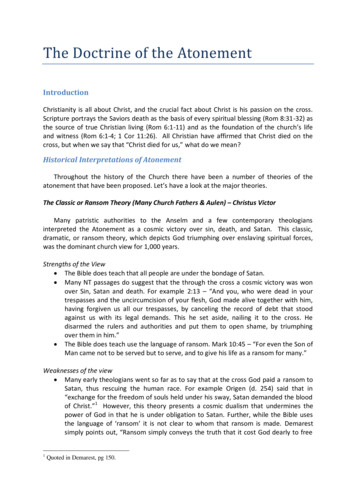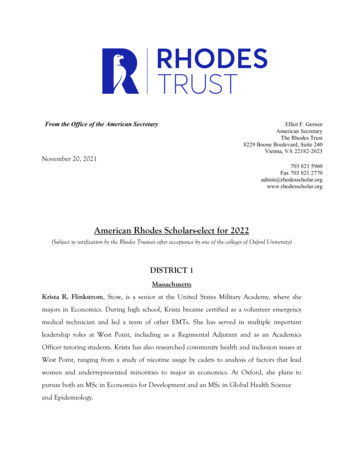
Transcription
1Philosophy and the Death PenaltyMichael Naas, DePaul UniversityDerrida begins the very first session of his two year seminar on the death penaltywith a rather vivid, literary, theatrical, perhaps even cinematographic evocation of anexecution, the early light of dawn in a prison, the memory of a sovereign decision thathad determined the place and hour of the execution, and the possibility of a last minutepardon from the sovereign himself who might always halt the proceedings with, say, atelephone call at the eleventh hour from the presidential palace or the prime minister'soffice or, imagine-because this almost never happens in reality-the governor'smansion in Texas. There are even stage directions in these opening pages to control thepace or rhythm of the narrative: Derrida writes between sentences "pause," "long pause,"and so on. Though he is not describing any particular death sentence but the generalsetting or mise-en-scene of a death penalty, though there is no particular neck in thenoose or head beneath the blade of the guillotine, the opening is meant to be dramatic,full of pathos, for "who would dare conduct," Derrida asks parenthetically, "a nonpathos-laden seminar on the death penalty?" It is at this point in his description-we areon the second page of the seminar-that Derrida draws our attention to someone who, hesays, is almost always there at the scene accompanying the prisoner from his cell,namely, a priest, whose presence at the scene elicits from Derrida this parentheticalremark: "I insist on this because 1 will be speaking above all of political theology and ofthe religion of the death penalty, of the religion always present at the death penalty, of thedeath penalty as religion."·Religion and the death penalty, religion as the death penalty, the death penalty asreligion: any of these, as 1 will argue, could have been the subtitle of this entire seminar.Religion, the death penalty, and then, as if these were inseparable from both, punishment,sin, sacrifice, redemption, blood, passion, agony, aesthesis, anesthesia, the cross, thegallows, the guillotine . In retrospect, we should not have expected anything different.For what is becoming clearer and clearer with the publication of each new volume of theseminars is that during the last two decades of his life what might have appeared to be a
2series of seminars on more or less contemporary philosophico-ethical problems ordebates-"questions of responsibility," as Derrida himself called them, namely, thesecret, testimony, hospitality, perjury and pardoning, the death penalty, the question ofsovereignty and the animal-were in the end all concerned first and foremost withreligion, or rather, with the political theology of these questions. With the publication ofeach seminar it is becoming more and more clear that Derrida was interested in showingthat so many of the concepts we believe to be purely political or even explicitly secularhave their origins in and so still need to be thought in relation to their Judeo-Christianheritage. The list of these concepts is now long and impressive. It includes everythingfrom a certain conception of democracy or cosmopolitanism to literature, work, theworld, forgiveness (see DPla 82, 89, and DPlb 135, 152), even the concept of religiontolerance. At the top of this long list would be a certain notion of political sovereigntythat, according to Derrida, who, on this account at least, is following Carl Schmitt, neverbroke away-and not even in modem democracies-from its theological origins. Thetheologico-political notion of a sovereignty that is unified or unitary, unconditional andall-powerful, would thus be at the origin of a certain conception of the death penalty andits attendant notions of sacrifice, redemption, and the sovereign pardon. One can see quiteclearly this Christian or theologico-political concept of sovereignty at the origin of thedeath penalty in someone like Joseph de Maistre, when he writes, and Derrida cites, "thedeath penalty represents a divine weapon granted by the sovereign God to the sovereignmonarch to fulfill a providential law" (DP1b 59). In the two years he devotes to the deathpenalty, then, Derrida seems to want to show how the concepts, rhetoric, symbolism,images, and imaginary of the death penalty are all determined and marked by a Christianor Judeo-Christian theologico-political heritage?The question of the death penalty thus fits in quite nicely to Derrida's overallproject to deconstruct this theologico-political heritage. 3 But it is perhaps still legitimateand instructive to ask why Derrida would devote two full years, from 1999-2001, to thequestion or theme of the death penalty almost twenty years after it had been abolished inFrance and a decade after the majority of European states had also abolished it or werepreparing to do so. Unlike questions of pardoning, forgiveness, testimony, or the natureand scope of sovereignty in general-questions that were often at the center of scholarly
3debates and were even discussed in the popular press in France and throughout Europe atthe time (Derrida mentions here, for example, the Catholic Church asking pardon for theInquisition, and he speaks elsewhere around this same time of the Truth andReconciliation Commission in South Africa, of debates over national and internationalsovereignty, and so on)-the abolitionist debate in France and Europe had become by1999 something of a non-issue, a thing of the past, une affaire classee. It is true that thedeath penalty had still not been universally abolished and that in 1999, says Derridaciting the statistic of Amnesty International in For What Tomorrow, more than 1,800people were executed in 31 countries, the vast majority of these in China (1076), Iran(165), Saudi Arabia (103), and then the United States (98). But still, why would Derridatake up the question of the death penalty nearly two decades after it had been abolished inFrance? Why devote two years to the subject so seemingly late in the game? (see FWT156)4One reason is surely the American context, which Derrida refers to regularly inthe seminar, as well as his American audience, which he always seems to take intoaccount in these seminars, especially since he would be giving large portions of them inthe United States. In one of the interviews in For What Tomorrow Derrida even speaks ofthe specificity of these sessions in the U.S., noting: "during my seminars, in New York,in Chicago, in Irvine, California, we spent the first part of our sessions analyzing itemsfrom the written and televised press on the subject" (FWT 158i. The fact that manystates within the Unites States still maintained and exercised the death penalty will be ofgreat importance to Derrida throughout the seminar. But it is not insignificant that thisfact is interpreted by Derrida in the light of his general focus on the theologico-politicaldimension of the death penalty. It is in large part because the United States is, as Derridacalls it, "the most Christian democracy in the world" that its resistance to abolishing thedeath penalty will be of such interest to him (DP1b 71). 6 The American context will alsoprovide Derrida with prime source material for the debate over the nature of cruelty in thedefinition of cruel and unusual punishment, for the whole question of anesthesia, for thequestion of race in the unequal application of the death penalty, for the use of capitalpunishment on the mentally handicapped, and so on (see FWT 158). There will be, notice,no similar scrutiny of the three countries that led the United States in executions at the
4time, Iran, Saudi Arabia, and, especially, China, in large part, no doubt, because they areneither Judeo-Christian nor predominantly European in culture and so have not enteredinto the debate over the death penalty in the same way. 7One must thus constantly keep the American context in mind when reading thisseminar, even if the subject is significant for Derrida well beyond the Americancontext-and even beyond any eventual abolition of the death penalty in the UnitedStates or elsewhere. For throughout the seminar Derrida will ask whether even aneventual universal abolition of the death penalty in law really would do away with thedeath penalty altogether, that is, with its rhetoric and its logic. He will thus ask whethersome death penalty would not remain even there where it has been abolished by law. Toreturn to the point with which I began, we might compare this to Derrida's insistencethat, even in a so-called secular age, the theological origins of political concepts remainto be deconstructed. Indeed it is perhaps especially in a supposedly secular age ofcosmopolitanism, humanism, and so on, that the theological origins of concepts such asdemocracy, the nation state, the nature of the human, and so on, call out to be questioned.This relation between the abolition of the death penalty and the dawn of a secular age isthus perhaps more than just a comparison or analogy here. In both cases, Derrida is tryingto uncover the now very hidden and often denied religious or theological origins of acertain conception of the human, of humanism, human rights, and so on, that makes it atonce possible both to speak of a secular age and to call for the universal abolition of thedeath penalty.But the comparison or analogy runs even further. Both the ideology of secularismand the abolitionist struggle, Derrida underscores, are modern inventions, inheritancesfrom the Enlightenment. It is no coincidence that Derrida's analyses of the death penalty,of secularism and cosmopolitanism, all focus explicitly on the very same time period andoften the very same thinkers-for example, Kant, who, as the figure par excellence of theEnlightenment, features prominently in Derrida's work on hospitality andcosmopolitanism, on democracy and religion, and, here, on the death penalty. While acertain death penalty-or a certain ritualized putting to death-has been around formillennia, both inside and outside of Europe, Derrida's primary focus is on the deathpenalty in European modernity and European law, including their extension and
5transformation in American law. In For What Tomorrow Derrida goes so far ask ratherprovocatively whether "there is a 'death penalty,' dare I say worthy of the name, outsideEuropean law" (FWT 148). It is to this sphere of European law, along with the theologyand philosophy that inform it, that Derrida will restrict for the most part his analysis.While Derrida in the opening sessions of the seminar will thus make a couple ofreferences to Plato's support of the death penalty, while he refers to a certain deathpenalty in Exodus, and while all four of his "theatrical paradigms of the theologicopolitical dimension of the death penalty" will be decidedly pre-modem (Socrates, Jesus,Joan of Arc, and Al Halaj (DP 1b 26), the bulk of the analysis will be focused onEnlightenment (Beccaria, Kant) and post-Enlightenment figures (Hugo, Camus,Blanchot) and on the history of the death penalty in the United States.To ask about the death penalty is thus another way to ask about the theologicopolitical notions that inform modernity and the Enlightenment (DP Jb 177). One can thusask what it was about the European Enlightenment that led it to produce these relateddiscourses of abolitionism and secularism, or one can follow Derrida when he suggeststhat "the death penalty is [perhaps] the best way to ask the question "What is theEnlightenment?"" (DP 1b 57) According to this latter hypothesis, the death penalty wouldbe an exemplary theme for illuminating the underlying Christian or theologico-politicallogic and rhetoric of the Enlightenment and everything that has followed from it (DP 1b75).8 It would be through the death penalty-through an analysis of discourses both forand against it-that Derrida will be able to expose "the double Christian root of both thedeath penalty and its abolition" (DP Jb 33) and, it seems to me, the Christian root of itsabolition even more than the death penalty itself precisely because this root is even morehidden and often passes itself off for something it is not-whether this be a puresecularism or an atheistic humanism.Indeed it is notable that Derrida in the seminar seeks to identify and question thereligious dimension not just and not even primarily of various Enlightenment or preEnlightenment justifications of the death penalty but of the abolitionist arguments andrhetorics against it. Because the theological origins of the death penalty itself are soobvious, as we saw a moment ago in the quote from Joseph de Maistre, Derrida willspend very little time on such pro-death penalty discourses, reserving more of his analysis
6for the more difficult case of Kant or abolitionists such as Beccaria, who try to think thedeath penalty in relation to both secularization and divine law (DP 1b 160). But Derridawill spend even more time, indeed much more time, on Victor Hugo and, to a lesserextent, Camus, in order to demonstrate how the former's conception of natural lawcoincides with religious law or a law of Christ (DP 1b 5, 43-45, 49) as well as a certainChristian humanism (DP 1b 65, 70, 83, 84c, 91c) and how the latter's atheistic discourseconceals a very similar Christian humanism.The opposition Derrida plays out in the death penalty seminars is thus notbetween a discourse that justifies the death penalty through a reference to divinesovereignty and a purely secular, non-religious discourse against the death penalty. It is,rather, a question of "[the] divine law of abolitionism against [the] divine law of the deathpenalty" (DP 1b 59). When it comes to the abolitionists versus the proponents of the deathpenalty, Derrida detects Christian origins behind both, since both speak in the name oflife, the inviolability of life, or, like Kant, in the name of a value or dignity greater thanlife. 9 Instead of framing the debate in terms of a Christian or religious defense of thedeath penalty and a secular opposition to it, Derrida tries to find the common Christianroot of the two discourses and, in the process, explain what he calls the "ambiguity" ofChristianity, that is, its simultaneous promotion of both the sanctity of life and its call forthe sacrifice of life (DPlb 4).10Not even among the abolitionists is the opposition Derrida develops between areligiously oriented abolitionism that uses the language of natural law, humanism, or thespirit of the true Christianity (Hugo) and a non-religious or even atheistic or antiChristian abolitionism (Camus) (DP 1b 91-92). For Derrida, the discourses of both Hugoand Camus are Christian (DP 1b 92, 157). As he argues in relation to the latter, "Christianmonotheism is a humanistic immanentism . and Camus's discourse . would be moreChristian, more Christ-like, than he thought" (DP 1b 92).11 Though Derrida asks early inthe seminar whether the abolitionist movement is Christian or a kind of atheist humanism(DP1a 95), he ultimately demonstrates that this is a false opposition insofar as humanismis in most of its incarnations essentially Christian.It might thus be said that, for Derrida, the debate over the death penalty is JudeoChristian all the way down, on the side of both the proponents and the abolitionists. If
7Derrida spends so much more time with the abolitionist discourses than with those of theproponents of the death penalty, so much more time criticizing, deconstructingabolitionist discourses, it is perhaps because his goal-as an avowed abolitionist-is tostrengthen and bolster these abolitionist discourses by means of another, lessdeconstructible, less Judeo-Christian and more "philosophical, more generalizable,abolitionism. It is because, as he says in For What Tomorrow, the abolitionist discourse"in its present state, seems to me greatly perfectible, philosophically and politicallyfragile, also deconstructible" (FWT 148).Derrida is thus writing about a certain historical epoch coming out of theEuropean Enlightenment in which arguments both for and against the death penalty aremarked by a Judeo-Christian heritage and he is writing within a particular historicalepoch in which the prevailing rhetoric within much of Europe is that the universalabolition of the death penalty is well underway, an abolition that will be carried out in thename of the fundamental dignity of man or in the name of human rights, in the coming ofage of a humanity that will have left behind the religious beliefs of its childhood. Butbecause the concepts in the name or under the aegis of which this abolitionist discourse isto be constructed are all marked, as Derrida suggests, by a certain Judeo-Christiantheology, then the deconstruction of these concepts remains to come, and it remainsperhaps all the more urgent when it appears unnecessary or already completed. Derridathus seem to be suggesting here that a deconstruction of the death penalty is never morenecessary than after its abolition or its imminent abolition, just as a deconstruction ofChristianity or the theologico-political is never more necessary than in a so-called secularage.What is called for, then, is a deconstruction of certain concepts, practices, andinstitutions, including the institution of literature in both its pro-death penalty andabolitionist forms, but perhaps first of all, for Derrida, a deconstruction of the Westernphilosophical tradition. For here as elsewhere Derrida is attempting to show both thetheologico-political stakes of the discourses he is analyzing and the tendencies, thepresuppositions and prejudices, of an entire philosophical tradition, the systematic andnot simply contingent or occasional relation between, here, philosophy and the deathpenalty. As Derrida puts it in a very telling marginal note to the very first session: "No
8philosophy against the death penalty" (DP 1 24). In the interview in For What Tomorrowentitled "Death Penalties" Derrida is even clearer than in the seminar itself aboutphilosophy's support of the death penalty. He there speaks of this "most stupefyingalmost the most stupefied-fact about the history of Western philosophy: never, to myknowledge, has any philosopher as a philosopher, in his or her strictly and systematicallyphilosophical discourse, never has any philosophy as such contested the legitimacy of thedeath penalty. From Plato to Hegel, from Rousseau to Kant (who was undoubtably themost rigorous of them all), they expressly, each in his own way, and sometimes notwithout much hand-wringing ([as in] Rousseau), took a stand/or the death penalty"(FWT 146).This sweeping claim about philosophy, however interesting in itself, mightprofitably be juxtaposed with Derrida's question in Rogues, "why are there so fewdemocrat philosophers (if there have been any at all), from Plato to Heidegger?" (Roguesxxx) and his claim in The Animal That Therefore J Am that no philosopher quaphilosopher has questioned the single, indivisible line distinguishing man from theanimal. Since Derrida is interested in the system that links various philosophies andphilosophers, we are invited to ask along with him what notions of cruelty, sacrifice, orblood, what conception of the dignity of life or natural law, what religion, would allowphilosophers across centuries, traditions, and languages-though particularly in Europeanmodernity-to maintain a discourse that is at once pro-death penalty, anti-democratic,and overwhelmingly anthropocentric. Derrida's broad claims about philosophy's supportof the death penalty, its critique of democracy, and its affirmation of an indivisible lineseparating the human from the animal are similar not only in their scope and rhetoricalformulation but in their affirmation of the very same "carno-phallogocentric" traditionthat places man, and often a certain transcendence of man, at its center. To question thedeath penalty, then, is to question the "carno-phallogocentrism" of which a certainthinking of sovereignty, of democracy, of law, of man in relation to the animal, all forman essential part (DP 1a 31).What is it about philosophy, then, philosophy as opposed, perhaps, to literature,where Derrida finds all kinds of exceptions on each of these points, that leads to thesepositions? 12 Derrida's answer would no doubt be complex and would work on multiple
9fronts, but it would probably begin by pointing out a common call to sacrifice orminimize life in the name of a value or a life greater than life. From Plato's definition ofphilosophy as the practice of dying to Kant's identification of the priceless dignity of manbeyond phenomenal life, to Heidegger's claim that only Dasein has a relation to death assuch, philosophy identifies the confrontation or overcoming of death, the sacrifice of life,with the affirmation of a life beyond or greater than life, a life and thus a relationship todeath that would be what is truly proper to man and not to any other form of animal life.Derrida's task in the death penalty seminar is to show in each case how theseconcepts and practices-death penalty, carno-phallogocentrism, religion andphilosophy-all form a system or a matrix, a structure or a structural ensemble. Withoutreducing any of these discourses to another, and without ignoring the particularities ofeach, Derrida demonstrates how a Christian or Judeo-Christian theologico-politicalheritage marks and determines these discourses, and particularly philosophy, insignificant ways. His main objective in the seminar would be to criticize or deconstructcertain abolitionist discourses of modernity in order to develop his own, let us call it,more "philosophical," less theological, less strictly Judeo-Christian, more universalizable,maybe even more Enlightened abolitionism. He does not want to be a philosopher whojust happened to be against the death penalty, but a philosopher, perhaps the firstphilosopher, to provide a genuinely "philosophical" abolitionist discourse, aphilosophical discourse that does not exclude, however, everything that is typicallyexcluded from philosophy, be it literature, history, philology, rhetoric, theatricality, orpathos-the reason or reasons of the heart. And he would have provided an analysis thatcontributes to the larger deconstruction of the theologico-political and its notion ofsovereignty that he would have been pursuing for many years and would continue topursue right up to the end.To conclude, I would like to suggest that it is only by looking at this largercontext of the death penalty seminar that we will be better able to understand what at firstsounded to my ears as a somewhat strange if not strained ending of this first year of thedeath penalty seminar. Is it a coincidence, or an essential consequence of the largerconfiguration he is trying to follow, that Derrida at the end of this first year of theseminar relates the question of the end of the death penalty to vegetarianism? Almost in
10anticipation of The Beast and the Sovereign seminars, though also looking back at textssuch as "11 faut bien manger" and those parts of The Animal That Therefore I Am that hadalready been written, Derrida seems to suggest that just as we would not put an end tocarnivorousness or carno-phallogo-centrism by all becoming vegetarians, so we wouldnot put an end to the death penalty by abolishing it in law. This does not mean, of course,that Derrida is suggesting we should not try to aim for such a universal abolition or thatthe question of eating or not eating meat should not be of concern. But in the course ofthis first year of the death penalty seminar Derrida has attempted to understand theunderlying structure or logic of the death penalty beyond what is commonly called thedeath penalty in law. In other words, he has tried to provide a "philosophical" and not justa legal definition of it. He thus argues, for example, that "the possibility of the deathpenalty begins where I am delivered into the power of the other, be it the power of theother in me" (DP1b 141). The scandal of the death penalty would consist in thiscalculation by the other of the instant of my death, a mechanical calculation of the instantthat leaves no room for the incalculable future or for the event-even if, though this isanother story, this calculation is always a kind of phantasm of control or mastery over theevent.)3 In short, Derrida claims, what is brought to an end through the death penalty-orat least this is the phantasm-is the very finitude of my life. "Death penalty" thus comesto mean something different in the wake of Derrida's analysis than it did before it. In linenow with Derrida's philosophical rethinking of the nature of experience, time, the future,and the event, it is more generalized, can no longer be rigorously opposed to other kindsof punishment or practices 14, and can no longer be restricted to its legal definition, evenif, as a committed abolitionist, Derrida believes one must fight against this definition aswell. In short, it must now be thought-perhaps like cruelty-according to a differentialrather than an oppositional structure. Even if the death penalty were universallyabolished, therefore, there would remain this differential structure of the death penalty. 15And the same goes, for this would be as it were the ur-matrix for all these questions, forsecularism: though we live in what many-and especially in France and Europe moregenerally-believe to be a secular, laic age, Derrida reminds us to remain vigilant inorder to detect and deconstruct the religious dimension behind all our seemingly secularor non-religious concepts, from democracy to religious tolerance to the death penalty to,
11especially, certain abolitionist discourses against the death penalty. Indeed the force ofDerrida's deconstruction of the death penalty comes precisely from this vigilance in theface of the view-the dogmatic view-that now that the death penalty is on its way tobeing universally abolished there is no longer any death penalty to worry about. Derrida'sseminar reminds us that this would be a serious and dangerous error of interpretation, andone that might easily lead to the triumphant return and intensification of the deathpenalty-either in its generalized form or perhaps one day in its restricted and traditionalform, a death penalty that might one day return in the name or under the guise of a newhumanism, in the name of a value greater than life itself, a value that would demand thesacrifice of human life in the name of a law or a humanity that exceeds human life.Though Derrida will usually hesitate to call this an outright "deconstruction ofChristianity," to use the phrase of Jean-Luc Nancy, it is indeed a deconstruction of theAbrahamic lineage that Derrida seem to have undertaken during the last couple ofdecades of his work. If Derrida is less inclined than Nancy to use the phrase"deconstruction of Christianity," it is perhaps because he is more wary than Nancy ofreinscribing Christian concepts such as fraternity, community, or love in a differentregister, well aware, as he is, that Christianity will have undertaken throughout its historyits own Aujhebung (DP Jb 90) and its own deconstruction (DP Jb 135), its ownreinscription of concepts that leaves everything in tact-or else sublimates and raiseseverything to a new level. It has, for example, provided a powerful deconstruction of theconcepts of life and death by relativizing or banalizing the latter through reference to abeyond while reinscribing the former as life-everlasting beyond the phenomenal,temporal realm (DP Jb 146). Hence Derrida speaks in the death penalty seminar of a"radically non-Christian deconstruction" (DP Jb 136), a non-Christian deconstruction ofthe Christian heritage of so many of our apparently secular terms, concepts, andinstitutions. This should not be understood, let me be clear, as an assault on religion or asa call for something like "the end of religion." In For What Tomorrow Derrida maintainsthat while he has always pursued "as far as possible the necessity of a hyper-atheologicaldiscourse," he has never had any desire "to destroy or to disqualify" an Abrahamicculture (at once Jewish, Christian, Muslim) on which, as he says, he has never ceased tomeditate (FWT 164). Because since Christianity has carried out its own deconstruction of
12sorts, Derrida is calling for "a deconstruction of this deconstruction," deconstruction ofthis '''Christian' landscape of deconstruction" (FWT 165), a "philosophical"deconstruction, therefore, of this Christian deconstruction, which would thus have torethink, among so many other things, blood, sacrifice, life, death, law, redemption,survival, and perhaps first of all, because people's lives are still on the line as a result of itand because it is easy to think that it belongs to a bye-gone age, the death penalty. 161Derrida speaks near the very end of the seminar of "the priests and the confessorsritually assigned to the last scene" (DP1b 174).2On the theologico-political in general, see DP 1b 4, 43, 135; for the theologico-politicalstakes of pardoning, see DP 1b 157 and 152: "This is one of the places of articulation withreligion and with theology, with the theologico-political. For this phantasm ofinfinitization at the heart of finitude, of an infinitization of survival assured by calculationitself and the cutting decision of the death penalty, this phantasm is one with God, with, ifyou prefer, the belief in God, the experience of God, the relation to God, faith orreligion."3Derrida has a text from around this time entitled precisely "Peine de mort etsouverainete (pour une deconstruction de l'onto-theologie}," in Divinatio, no. 15,2002:13-38.4See FWT 156; I am of course exaggerating just a bit here: one still speaks in Europe ofthe death penalty as a condition, for example, for entering the European Union andhuman rights groups often speak out against it as a violation of human rights.5Der
Philosophy and the Death Penalty Michael Naas, DePaul University Derrida begins the very first session ofhis two year seminar on the death penalty with a rather vivid, literary, theatrical, perhaps even cinematographic evocation ofan execution, the early light ofdawn in a prison, the memory ofa sovereign decision that


